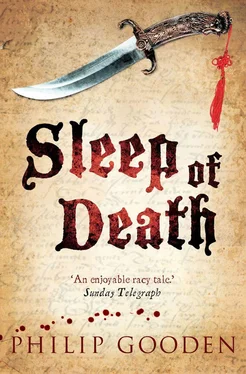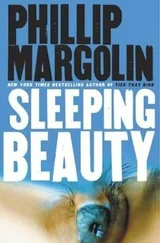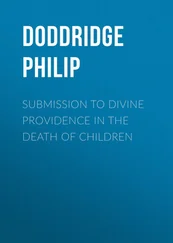Philip Gooden - Sleep of Death
Здесь есть возможность читать онлайн «Philip Gooden - Sleep of Death» весь текст электронной книги совершенно бесплатно (целиком полную версию без сокращений). В некоторых случаях можно слушать аудио, скачать через торрент в формате fb2 и присутствует краткое содержание. Год выпуска: 0101, ISBN: 0101, Издательство: Constable & Robinson, Жанр: Исторический детектив, на английском языке. Описание произведения, (предисловие) а так же отзывы посетителей доступны на портале библиотеки ЛибКат.
- Название:Sleep of Death
- Автор:
- Издательство:Constable & Robinson
- Жанр:
- Год:0101
- ISBN:9781472104311
- Рейтинг книги:5 / 5. Голосов: 1
-
Избранное:Добавить в избранное
- Отзывы:
-
Ваша оценка:
- 100
- 1
- 2
- 3
- 4
- 5
Sleep of Death: краткое содержание, описание и аннотация
Предлагаем к чтению аннотацию, описание, краткое содержание или предисловие (зависит от того, что написал сам автор книги «Sleep of Death»). Если вы не нашли необходимую информацию о книге — напишите в комментариях, мы постараемся отыскать её.
Sleep of Death — читать онлайн бесплатно полную книгу (весь текст) целиком
Ниже представлен текст книги, разбитый по страницам. Система сохранения места последней прочитанной страницы, позволяет с удобством читать онлайн бесплатно книгу «Sleep of Death», без необходимости каждый раз заново искать на чём Вы остановились. Поставьте закладку, и сможете в любой момент перейти на страницу, на которой закончили чтение.
Интервал:
Закладка:
TB: Is he an author?
NR: It is the name of a play, a famous play, about — about a death in a household.
TB: I do not attend the playhouse.
NR: I thought not. But I am interested in the tragic events which happened in this house because-
TB: — because you wish to put them on stage?
NR [ seeing that I am venturing into deeper and deeper water ]: No, no. I am interested because — because ‘Humani nihil alienum’.
TB: I don’t understand your words, Master Revill. Plain English is good enough for me. Nevertheless, if you must ask some questions for private reasons of your own, do it and be done with it.
NR: Thank you. When did you first become aware that Sir William had died?
TB: I heard the cries and wailing from the other side of the house after they had brought his body in from the garden. One of the servants, Janet I think, went running around the house in tears and, all those that did not know, she told willy-nilly.
NR: In the afternoon of that day you were at your post here?
TB: I have already said so.
NR: Were there any visitors that afternoon?
TB: Most likely.
NR: Can you call any of them to mind?
TB: One was of your kind.
NR: My kind?
TB: A player.
NR: A player?
TB: Or a — whatd’youcallit? — author, I forget which.
NR: How do you know?
TB: He told me. Just as you told me a minute ago that you were with such-and-such a company at such-and-such a playhouse, he told me that he was an author or a player. Perhaps there is something about the gentlemen in your profession, you cannot hold your tongues but must be telling all the world your business.
NR: Did you admit him to the house?
TB: No.
NR: You turned him away?
TB: No.
NR: I don’t understand.
TB: It is simple enough. Listen. I was sat here as I am with you now, and this ‘gentleman’ knocked and announced himself as a player or an author I forget which — as if he expected I would fall down backwards in amazement at his greatness. But before I was able to say anything to him there was a great commotion in the street beyond the gate and so I went to see what was happening.
NR: The commotion was to do with the gentleman?
TB: Nothing at all to do with him. It was some apprentices who had uncovered two lurking foreigners and were scoffing and laughing at them. The boys made a ring about them and were mocking the foreigners’ hats or the foreigners’ manners or their foreign words.
NR: You knew they were foreign?
TB: I heard their words and I did not understand. I only know plain English, Master Revill.
NR: What did you do when you saw these apprentices and these tormented foreigners, Master Bullock?
TB: Do? It was no business of mine. Let them that be a-cold blow the coals.
NR: Of course. What happened?
TB: The foreigners received a blow or two and a hatful of curses before they managed to run away. They got off lightly — but I think the boys meant no harm.
NR: So you stood outside the gate.
TB: I guarded the house. If they had run in my direction I would have shut the gate against them.
NR: The apprentice boys?
TB: The foreigners.
NR: Then you returned to your post in here?
TB: Just so.
NR: And the visitor, the, ah, gentleman?
TB: Gone.
NR: Where? Into the house? Back into the street?
TB: Into the street.
NR: You’re sure? You saw him?
TB: No. But he would not have dared to enter the house, so he must have returned to the street.
NR: While you were watching the apprentice boys and the foreigners.
TB: While I was doing my duty, guarding this house.
NR: You’ve never seen him since that day, the afternoon of Sir William’s death?
TB: Many people visit this house. The Eliot family is a great family and they are accustomed to receiving important visitors. Those are the ones I remember.
NR: So you know nothing about this caller except that he was a player or an author-
TB: Oh he gave his name, Master Revill.
NR: Which you cannot call to mind, no doubt.
TB: Yes. But not perfect. Like a muddy reflection I cannot get it whole.
NR: Part will do.
TB: Let me see. What was it? Shagspark, Shakespurt, Shackspeer, something like that.
Once again I was playing Jack Southwold in A City Pleasure, the play about the country brother and sister who come to London and who are, it is revealed at the end, not really siblings and so may marry in safety. The play was a hit, a palpable hit, despite my predictions about it to Nell. It was during this piece that I had encountered the Eliot family for the first time and, as Thomas Bullock had reminded me, helped to expose the false steward Adrian. All this only a few days earlier, but it seemed like another life. And that had led to the invitation from young William Eliot to lodge in his mother’s and uncle’s house to see if, by keeping my eyes and ears open, I might detect anything out of the way about the death of his father.
Well, I had found out things, unwelcome things. Like a foolish mariner that sets out on a bright morning across smooth glittering water, I started full of spirit and expectation. And before I knew it I was sailing beyond the confines of the harbour and out into the open seas and had no charts to help me while, overhead, the skies looked dark. For what I was groping my way towards was that the mysterious man who had called at the house on the afternoon of Sir William’s death, the man who had eluded the distracted doorkeeper, slipped into the main garden and then somehow penetrated the inner garden, the man who had hidden himself up in the pear tree and carved his initials into the bark as he waited to drop on his victim like a thunderbolt, this man was none other than Master William Shakepeare, the principal author, joint shareholder and occasional player in the Chamberlain’s Men. The carved initials had been given flesh, as it were, by Thomas Bullock’s words, which could not but support the idea that Master Shakespeare had indeed haunted this house.
I had earlier conceived of Master WS as a murderer and a cheat and a rogue — just as I had seen him as a bishop, a prince and a king. He was all these things and more besides, because these were the things which he had made in the quick forge of his imagination. But now I began to wonder whether he might not be in reality what he had so successfully presented on stage in the persons of King Claudius or Richard III, a secret and a sly murderer.
The part of the crookbacked king brought to my mind a tale, a piece of gossip, which was given to me by Robert Mink. As well as his own lyrics, he evidently loves a naughty story. He wheezed with laughter as he told me backstage how, one day when Richard III was to be performed, Master WS noticed a young woman delivering a message to Dick Burbage so cautiously that he knew something must be up. ‘Or soon would be up,’ snorted Mink. The message from the girl was that her master was gone out of town that morning, and her mistress would be glad of Burbage’s company after the play; and the tail of the message was to know what signal he would give so that he might be admitted. Burbage replied, ‘Three taps at the door I will give, and and then I will say, “It is I, Richard the Third”.’ Richard was one of Burbage’s biggest parts, according to Mink. ‘Women were drawn to his crookedness.’
The servant girl immediately left, and Master WS followed after her till he saw her to go into a particular house in the city. He enquired about it in the neighbourhood and he was informed that a young lady lived there, the favourite of some rich old merchant. Near the appointed time of meeting, Master WS thought it proper to arrive rather before Dick Burbage. He knocked three times on the door, as agreed, and delivered Burbage’s line about Richard the Third. The lady was very much surprised at Master WS’s taking Burbage’s part; but our author is after all the creator of Romeo and Juliet. The language of love and persuasion flows in his veins. You may well believe that the young lady was soon pacified, not to say satisfied, and both she and Master WS were happy in each other’s company. And now here comes Dick Burbage to the same door of the same house, and repeats the same signal. Knock, knock, knock. And he delivers his line about the crookback king, little knowing that another has stolen a march on him. But Master WS, he pops his head out of the window and tells his fellow player and shareholder to be gone. ‘And do you know what he said to him?’ said Master Mink, hardly able to get the words out for laughter, “‘This is not your place, for William the Conqueror reigned before Richard III”.’
Читать дальшеИнтервал:
Закладка:
Похожие книги на «Sleep of Death»
Представляем Вашему вниманию похожие книги на «Sleep of Death» списком для выбора. Мы отобрали схожую по названию и смыслу литературу в надежде предоставить читателям больше вариантов отыскать новые, интересные, ещё непрочитанные произведения.
Обсуждение, отзывы о книге «Sleep of Death» и просто собственные мнения читателей. Оставьте ваши комментарии, напишите, что Вы думаете о произведении, его смысле или главных героях. Укажите что конкретно понравилось, а что нет, и почему Вы так считаете.












